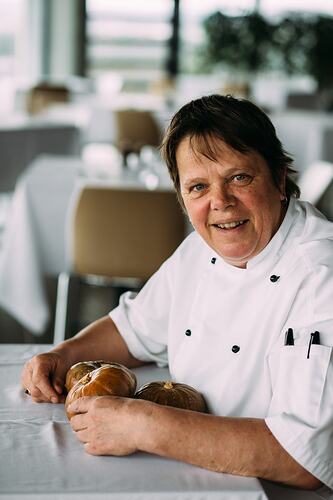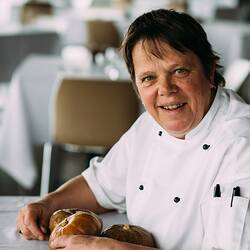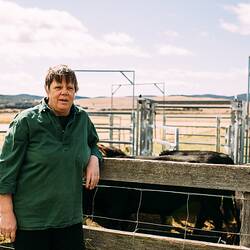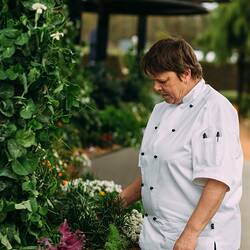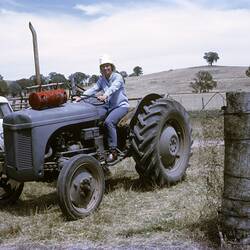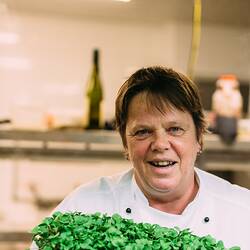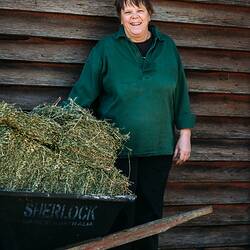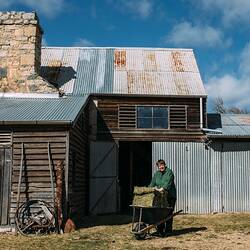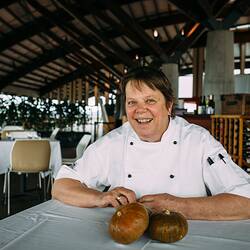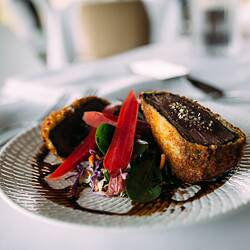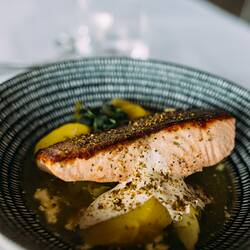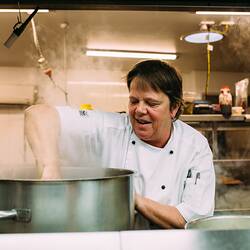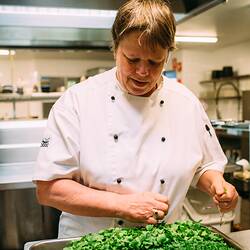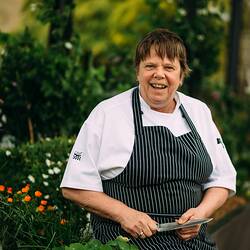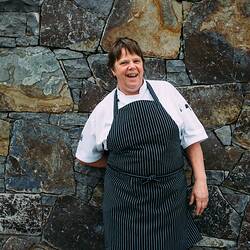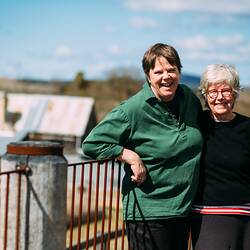Summary
This article is based on an interview that was conducted in 2017 between Invisible Farmer Curator Catherine Forge and paddock to plate farmer and chef Janet Jeffs for the Invisible Farmer Project.
Janet Jeffs started farming in the mid-2000s. She was inspired to reach a better understanding about seasonal farming through her farm-to-plate restaurant, Ginger Catering.
'So, it's kind of evolved from food and wanting to understand why farmers did what they did. And the connection that I've got with farmers who produce food for me for the restaurant. So, I had to get a better understanding of what that was on about, and the only way I thought I could really do it was to have a go myself, which was virtually walking the talk. I would ask, how come they can't produce stuff all the same size? How come they can't produce stuff 24/7? When I started to farm myself, it was like a lightbulb moment of realising, there's so much more involved in this than what really meets the eye.'
After finishing her apprenticeship in Adelaide in the 1980s, Janet began her cooking career with Cheong Wong, a man preaching nose-to-tail methods of dining way before a zero-waste movement was trending on Instagram. She then joined Maggie Beer at her flagship Pheasant Farm in the Barossa Valley. Maggie's paddock-to-plate philosophy, volunteering community and use of seasonal produce was a turning point for Lisa and informs her menus today.
'People would turn up at the back door with things like caper berries and this really unique produce. That's where I really got the whole idea of the connection to what's grown around you.'
Now Janet lives in Canberra and these early lessons continue to inform her practices in her own food-to-plate projects - the Sprout Café and Conservatory Restaurant in the Canberra Arboretum. The biggest drivers of her business are suitability, support and quality. She has surrounded herself with farmers who are like-minded and only uses the highest quality produce available to her. This home-grown and local philosophy reaches right to the tips of her culinary practice where even the seasoning is home grown, dried and ground in-house.
'Really good quality food that's cared for, the taste comes through. People say to me, 'Wow what'd you do to that?' You don't have that many shots at getting food right, so you have to buy the best quality ingredients right from the start.'
Janet likes to keep her food-miles low by sourcing all her produce for her two venues from local suppliers. A list of suppliers appears at the bottom of the menus. For Janet, it's not the chef that inspires a good tasting menu, but rather the ingredients that bring out a great dish.
'You've got to do things to your ingredients that aren't too chef-y. Learning where they come from and how they're grown, what season they suit is all part of that. Respect of the ingredients is really important.'
One challenge Janet and her partner, artist Leeanne Crisp, faced when starting their farming journey was what to farm, as their block in Braidwood, New South Wales is only twenty acres.
'The idea was to make something or grow something which was really efficient. So, I chose rare breeds as something which would be contributing to the gene pool, because other people wanted these pigs that I started with first, and now I breed Dexters [Cattle].'
They raise a rare breed of Dexter Cattle, originally from Ireland that are about the third of the size of a fully grown milking cow. They are considered a recovering breed by the Livestock Conservancy and so are extremely rare in Australia.
'Having a rare breed means that there's not a lot of [them] around which makes it [breeding] more difficult. But in the end it's something I care about so it's worth it.'
Janet uses her Talk and Taste series to educate local consumers about growing, cooking and consuming food from their backyards. By sharing her own experiences she encourages people to care for the environment, support local farmers and eat healthily.
'We do get a lot of other people that come who get dragged along for whatever reason, and they say things like, 'Well, I've never thought about that.' Or, 'I've never been encouraged to grow my own -,' whatever it is, even if it's just a pot on a balcony that's got herbs in it, food you grow yourself will always taste better.'
Janet's philosophy is to encourage people to take responsibility for what's on their plate. Rural communities only flourish when they support each other, so community engagement is something Janet takes pride in. By starting locally she hopes to make a larger impact but firmly believes that eating clean and fair food is a sovereign right.
'We really try hard to engage with our community because they're the ones who support us. They're the ones who are our customers. And they're also the ones who have got that advocacy for making sure that what is on their plate is good and clean and fair.'
Her pro-tips for sustainable living and farming all come back to the community and building networks and friendships. Buying from people that you can meet and have a conversation about your food is the first step. This can be as simple as visiting your local farmers market and asking where the food you're going to eat is from. Janet even suggests vising your local farm to see how your produce is grown, who's taking care of it and what really goes into your meal at the end of the day.
Janet is the first to admit that eating your ethics is hard work and that this can be even harder for female farmers who have had to struggle to be recognised as farmers in their own right. Reflecting on her own farming journey, Janet remembers the challenge of being accepted at Agriculture College in Roseworthy.
'When I first went to Roseworthy which would have been 1991, it was a very big struggle for women to be accepted at Roseworthy and I think Pam Dunsford who was a wine maker at Chapel Hill Wines in South Australia was one of the first women graduates, because it was a male only college then. An ag college that's male only. I mean, people wouldn't believe that now, but this is true. It was all white men, and boys off farms that just had this- I don't know, Masters of the Universe kind of attitude to things. I mean they were nice farmers but they just had this male dominating thing, and they wouldn't budge from the status quo, especially when ideas were suggested by a woman.'
Nearly thirty years later, Janet is confident that times are starting to change and female farmers are making strides in the agriculture business. She hopes that the business model of keeping things sustainable and local will continue to grow.
More Information
-
Keywords
Farming Methods, Farming Information, Farm Workers, Farm Gates, Agriculture, Food & Drink Preparation, Food, Food Processing, Food & Catering Industry, Food Workers
-
Authors
-
Article types
